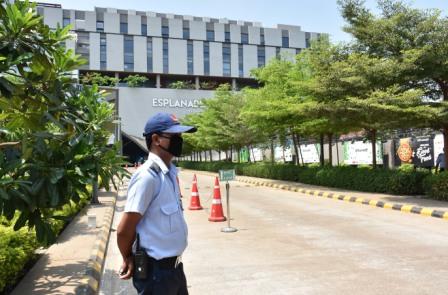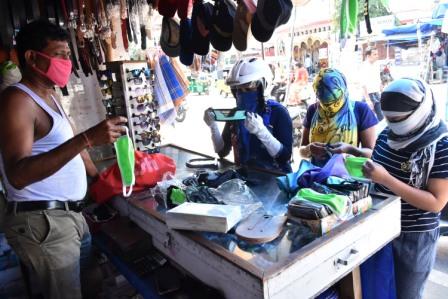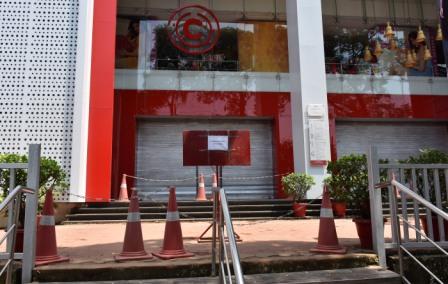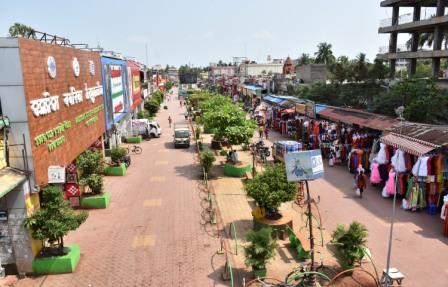BHUBANESWAR: Following orders from Commissionerate Police, all malls in Bhubaneswar and Cuttack will be closed till March 31 in a bid to avoid any outbreak of COVID-19.
The state government has already ordered all educational institutions, cinema halls, swimming pools and gyms to be closed till March 31 with the same objective. However, post that order, many malls in the twin city saw decent crowd.
It was then, that the Commissionerate of Police took notice of it and issued the directive to restrict public from visiting any place which may see gatherings. The closure order was issued under Urban Police Act-35.

The city of temples saw many students leaving their hostels and heading their hometowns, Monday. Prasad Mohanty, a student from Rourkela in Utkal University here, who also left his hostel, said, “I am leaving for my home in Rourkela. People here aren’t feeling safe and everyone seems panicky.”
Orissa POST interacted with the citizens to know how they feel about the prophylactic measures adopted by the state.
Piyush Ranjan Rout, an urban planner in city, said, “That’s (shutdown) now a global practice. Shutdowns are totally new and foreign to us as we have never seen this kind of ‘lockdown’ in our democracy. We aren’t obedient to our governments like the Chinese. We should practice social distancing.” “Our government needs to handle the situation like South Korea; set mobile testing centres.”

Sidharth Mohanty, a city-based fashion designer, said, “People’s lives are at risk and this seems to be the most efficient method to avoid the virus from spreading. If we succeed in controlling the virus spread at this stage, we can save our people from Italy-like situation.”
“I would request everyone to be patient and cooperative with the government. I hope everyone is going to follow basic instructions like maintaining personal hygiene, washing hands regularly, avoid social gatherings and stay at home. I request people who have symptoms of cold or cough to get a proper check up and maintain distance from others.”
Bidya Singh, a teacher, said, “Prevention is always better than cure.” However, she pointed out that the shutting down of malls and other places of interests may spook the public. “Decontamination of public places is a must.”
Jyotsna Priyadarshnee, an anchor by profession, also echoed Bidya’s words. “Closing down everything will make the people panic! And in that situation they will opt for travelling anywhere they feel safer.” She said the state is not so-well prepared in terms of infrastructure to treat the virus. “In this season, cold and fever are quite normal. So, if one fears that s/he might have the virus, the only place the person can go to is RMRC.”

Health expert Anil Dhayal said, “We do understand the government’s seriousness and announcements, but an analysis of medical infrastructure and other data of the top 10 affected countries shows that India lags far behind on the resources required to deal with a pandemic.”
The World Health Organization (WHO) recorded 1,32,536 cases across 123 countries in the week ending March 13. China, Italy, Iran, South Korea, Spain, France, Germany, the United States of America, Switzerland and Japan are the top 10 countries based on cases detected. They accounted for over 90 per cent of COVID-19 patients.
“India has fewer hospital beds and doctors per 1,000 people than any of those countries. India has 0.7 hospital beds and a similar number of physicians per 1,000 people in 2011.” China has 3.8 for the same year and Italy has 3.5. China also has a higher number of physicians (1.8) as does Italy (4.1).
Data also shows that 50.7 per cent of the rural population does not have basic hand-washing facilities, including soap and water (2017 data), he pointed out. It was 20.2 per cent in urban areas, around 40.5 per cent for the population overall.
“So, more than shutting down the city, the health infrastructure should be strengthened to tackle the situation,” he concluded.
Arindam Ganguly, OP






































